|
In some departments and states, having the right book to help you prepare for the entrance test can help a great deal.
|
So
you want to be a firefighter?
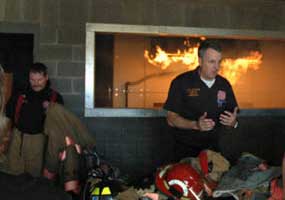
Photos
by Ben Saladino
All photos are at an actual fire school.
Training
Many
people might not believe the amount of school a firefighter
is required to have. This can take the form of a
city fire academy that can last for 15 months* or
a college program. In the city,
or regional, fire academy, the fire cadet attends
classes for over eight hours a day, five or more
days a week. Many departments now require new hires
to have already completed all their training and
be certified by the state, before applying for employment.
They will get this training by attending a community
college that offers fire service classes. This program
varies depending upon the school. Many community
colleges have fire service programs where they
offer basic firefighter or inspector certification
and then go on to provide advanced degrees in fire
protection. One can expect a basic firefighter certification
to require about thirty college credit hours. One
can expect a minimum of two semesters (or one year)
to qualify for state certification. In many states
the amount of time in college, for firefighter and
EMT, is longer and amounts to an associates degree.
There are classes on hydrodynamics, chemistry, building
construction and hours of math. The drop out rate
is high but once completed your chances of being
hired are good, but not guaranteed. Sample
Community College Fire Service Program.
Keep in mind that some state require training to the Firefighter I level while other require that all basic firefighters be trained to Firefighter II level. Before setting out to get your own training, be sure to know what level is needed for your state.
*As
an example of training with a large city's fire academy
one can consider the Dallas
Fire Academy. The actual rookie school is 6 months
long but before being assigned to a station the recruit
must also complete EMT and Paramedic school. This
can lengthen the training to 15 months.
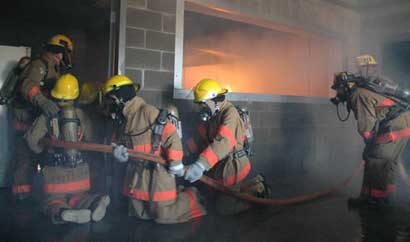
But
the training does not stop there. A basic firefighter
must attend twenty hours of continuing education
each year to keep his or her job. This is state designed
and certified training. Then for every special skill
a firefighter has, he or she must complete around
twenty hours of state or federal refresher training
each year. Examples of these skills include: Haz
Mat, Paramedic, Swift water, etc. On top of that,
is the training the city may require such as safety,
sexual harassment prevention, management and more.
If the firefighter wishes to promote he or she must
study for tests and probably take college or National
Fire Academy courses.
A
good example of how extensive advanced training
can be, is found in the Tampa Fire Department,
Tactical Rescue Team. Each member must be a paramedic
with at least three years experience before enduring
the 600 hours of initial training. This training
includes:
-
Tampa
Police Auxiliary Academy
-
Tampa
Police SWAT School
-
Tampa
Fire Rescue Sea, Air, and Land Rescue Course
-
US
Navy Water Survival
-
American
Red Cross Life Guard
-
NAEMT
EMT Tactical
-
Open
Water Scuba Diver
-
Search
and Recovery Diver
-
Rescue
Diver
-
Advance
Trauma Life Support
Continuing Education is 16 hours a month. (+ Firefighter
and Paramedic C.E.)
Tampa
Fire Department
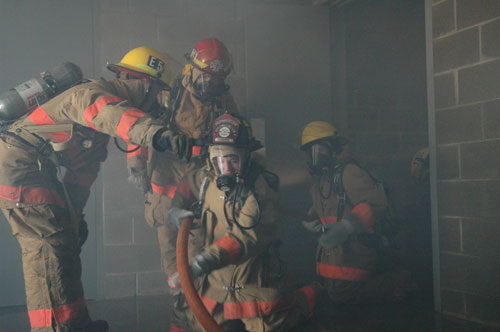
Getting
Hired
To
give you an idea of the selection process,
consider this. In the past ten years it was
not uncommon for
500 people to show up to take the entrance
exam for the Irving Fire Department. In the
late 80’s
they had well over 1500 sign up for one test.
Irving probably hires about four people a
year. On a big
year they might hire twelve. Some years they
may hire none. Other years, one or two new
recruits are
hired. Can you imagine 500 people showing up
for a chance for four jobs? Civil service
laws require
that they hire based upon the scores on the
test. The test has reading, math and general
knowledge
questions. It is common that only half, of
the participants, will pass this test.
In
an L. A. Times article in 2005, it was reported
that, "In January 2005, the Los Angeles County
Fire Department held a firefighter trainee
examination and more than 22,000 people applied."
Article here.

In the example above, it was given that, in the 80's and 90's, Irving
would have 500-1000 people show up to take
an entrance
test. But that was when they did not require
previous training. Like many cities, Irving,
in recent years,
has adopted a position where they only test
those people who have completed their firefighter
training.
Now it is common to have only 35 people show
up for the test. Update:
As of 2007 this fire department has decided
to return
to the practice of NOT testing people only
with their fire training completed. Now all
you need is a minimum
amount of college and be 21 to take the test
for employment. The college can be in any subject.
Having
fire service training helps your chances of
being hired mainly because you may do better
on the written
test. It might help your interview a little. NOTE: As of 2011, this city has gone back to not requiring college in order to take the entrance exam. This is mentioned to illustrate that one never knows what the requirements might be in any city, at any given time.

A
few, very large, cities still recruit like the military.
They may require some college but they do not require
any previous job training. These cities then put
their recruits through their school. Most smaller
cities now require that an applicant already have
all the training required by the state before they
are allowed to take the competitive entrance exam.
Several junior colleges have firefighter training
programs. Most firefighter curriculum or states also
require that all firefighters be medically trained
to the Basic EMT level.
Click
here to see the L.A. County application process.
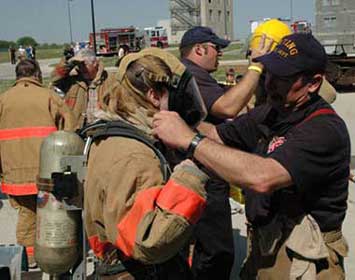
The
fire service is not just for men. In some departments
the number of females may be 10% or more. Women have
been members of the fire service for well over 25
years. There are over one million firefighters in
the U. S. Some reports say that there are as many
as 30,000+ female volunteer firefighters and over
6000 career female firefighters. There are female
officers of every rank, including battalion chiefs
and some assistant chiefs. There are at least twenty
fire departments whose chief is a female. These numbers
are changing every day as female firefighters retire
or even more are hired. For more information on the
subject, check out this excellent web site: http://www.wfsi.org/
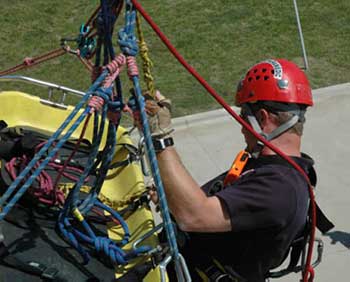
Salary?
The
pay a new firefighter can expect to receive varies
greatly in North America. Much of this has to
do with the cost of living in a particular
area. The
starting pay can range from about $25,000 a year
to about $50,000 or more. Many seem to fall in
the BELOW $35,000 range. But remember, that
is starting
pay. You will not be making that forever. Many
things can increase your salary quickly.
In many communities
you can receive $100-$500 more a month for special
certifications. A good example might be paramedic
training. It is also common to receive a substancial raise at one year.
There
are a few areas where the starting salary for
firefighters may exceed the amounts posted
here. But these
areas are where the cost of living is extremely
high also.
Do you have what it takes?
This
might sound corny, but being a firefighter is a
calling and a way of life. It is not just a job. You will be tested
on whether you really want the job from the very
first
day.
One can observe
applicants, in obviously good condition,
quit the physical agility test with two minutes
left, and only 15 feet to walk. The secret to becoming
a firefighter, DON'T QUIT! You have to want it.
There
are questions you must ask yourself. Are you mentally
and physically fit? Can you deal
with
death
and dying?
Do you have
the
character qualities that are needed? How well do
you react during stressful times? Do you have integrity? Do you really know the meaning of the word honor?
You
will be tested in ways you can't imagine. School
will be a challenge in many ways. It will test
you physically and emotionally. It will take time
away
from your family and friends.
Your
family should always come first, but they will
have to learn to share you. Unless you happen to
come from a fire service family, relatives will
not understand your decision to join our ranks.
But the tests do not end once you finish school
and get your first station assignment. You will
then face the challenges of your "probie"
year. During your first year at the station you
will be subjected to many tests. These will not
only be exams to test your knowledge, but tests
of your commitment to the team. In some departments
this
will mean that you can be tried or tested by any
senior member. You can be prohibited from various
activities until after your probationary period.
Do you become defensive when you are the subject
of some joke? For your sake, lets hope not.
There
will be "rights of passage" you will have to endure.
Remember, this is an honor. It has taken you a
long time to earn being soaked down after your first
good fire. You will never forget that fire or the
way your colleagues treated you afterwards.
Divorce
is high among firefighters and police officers.
Many have speculated as to the cause. Perhaps it
is because it takes a special spouse to understand
the love of the job. But it also takes a very strong
firefighter to realize that the job must be part
of a bigger responsibility to the family.
We
often group ourselves with our brothers and sisters
in the police department, but we are
not the same. Police officers, while a calling also,
takes a different type of person. The fire service
and police are different cultures. Police officers
often work in groups of one or two. They develop
strong bonds with a partner. Firefighters will
spend a third, or more, of their lives with a second
family.
Firefighters are some of the most
amazing people you will every find. Can you live up
to those
expectations?
Tattoos?
More and more police and fire departments are implementing regulations that prohibit ANY visible tattoos. Every month we hear of another city or agency who is making this policy. (See video below.) Some will allow you to wear long sleeves year round, but others don't. If you have a neck tattoo your chances of ever being hired go way down.
If you are considering employment as a firefighter, or police officer, please carefully consider the possible consequences of full arm tattoos. It is difficult enough to get hired in these professions. Don't add to the obstacles your will have.
The same is true for piercings.
This is a big subject right now. The following article (pdf) probably says it all. It points out that even the Army is cracking down on tattoos below the elbow.
"Body art can have a negative impact on any career."
http://www.firefightersabcs.com/files/Think-Before-You-Ink-Fire-Department.pdf
As you can see by the article (forum) link below, the wearing of tattoos is a subject being discussed. There are several different views here. Some departments accept tattoos without issue while others ban then completely. There is also every policy in between. Many use the "case-by-case" plan on tattoos. Who knows what that might mean for you. Does that mean that if they like you, your tat may be OK?
Fire Engineering Magazine Tattoo Article

Helpful Websites
There
are many sites that will help you locate job openings.
A site with a good overview of the fire service
as an occupation is from U.S. Department of Labor
Bureau of Labor Statistics. http://stats.bls.gov/oco/ocos158.htm#outlook
http://www.firejobs.com
http://www.firecareers.com
http://www.emsfirerescuejobs.com/
In Texas - http://www.tcfp.state.tx.us/employment.asp
LA County- "Be
a firefighter"
There
are also commercial web sites to help you with tests.
One is here:
http://www.firefighterprofessor.com/
A
website that appears to be a source for helping one
become a firefighter, or some other related job: FireStationNation.com.
They can help you with several aspects of becoming a firefighter. They
post positions and can help you in several ways. They
sell books on exam preparation and much more. (This NOT a paid advertisement
or an endorsement.)
Please contact for permission to reproduce anything on these pages.
Most
Action or Apparatus Photos Copyright© Ben Saladino.
Most photos since November 2002 taken with Nikon Coolpix 5700.
See hundreds more at: http://www.bensware.com/firetrucks/photos.htm
|
|
| | |